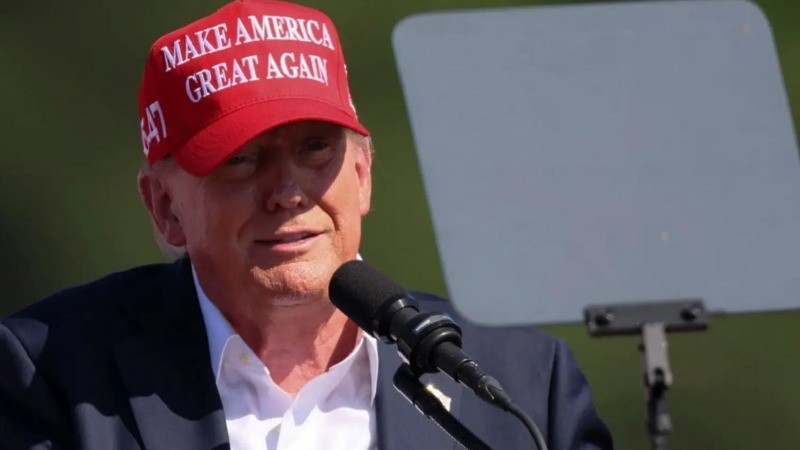
U.S. Trade Policy: Tariffs and Global Impact - A second term for Donald Trump would bring major shifts in U.S. trade policy. Trump has floated the idea of imposing a 10% tariff or higher on all imports to eliminate the U.S. trade deficit. Critics warn that such tariffs would raise consumer prices and destabilize the global economy. Trump has also hinted at increasing tariffs on nations that have levied tariffs on U.S. goods, with a special focus on Mexico and China. He has proposed a 200% tariff on cars from Mexico and seeks to phase out Chinese imports in areas like electronics, steel, and pharmaceuticals.
Immigration: A Tougher Stance
Trump has made it clear that if re-elected, he would reinstate his previous policies on illegal immigration. This includes increasing deportations, limiting asylum access at the U.S.-Mexico border, and using the National Guard or federal troops to assist in enforcement. Additionally, he aims to end birthright citizenship, limit legal protections for certain immigrant groups, and reintroduce the controversial travel ban that restricts entry from several predominantly Muslim countries.
Energy Policy: Fossil Fuels and Environmental Reversal
Trump has pledged to ramp up U.S. fossil fuel production by easing regulations on drilling and encouraging new pipelines. He wants to reauthorize oil drilling in Alaska’s Arctic National Wildlife Refuge and has said he would withdraw the U.S. from the Paris Climate Agreement once again. Trump also advocates for increased nuclear energy production and plans to roll back current electric vehicle mandates. His administration would prioritize energy independence, particularly in the context of global developments in artificial intelligence, which require vast amounts of power.
Economic Policy: Tax Cuts and Regulation Rollback
Trump's economic policies would include additional tax cuts, especially for U.S.-based manufacturers. He has proposed reducing the corporate tax rate from 21% to 15%. His administration would also focus on slashing federal regulations, which he claims limit job creation. Trump has also expressed his intention to support service workers by seeking to eliminate the taxation of tips and overtime wages. While most of his proposals would require congressional action, there are concerns that such tax cuts could significantly increase the federal debt.
Supreme Court and Social Issues: Shaping Future Decisions
Under Trump, U.S. courts could see further conservative appointments, particularly on the Supreme Court. His previous appointments helped eliminate federal abortion protections, and he is likely to continue appointing judges who uphold restrictions on abortion. While Trump has said he does not support a federal abortion ban, he argues the issue should be decided at the state level, and any legislation should allow exceptions for rape, incest, and health risks.
Foreign Policy: Recalibrating U.S. Alliances and Priorities
Trump’s approach to foreign relations is expected to challenge traditional U.S. alliances. He has criticized U.S. support for Ukraine in its conflict with Russia, suggesting he could end the war in 24 hours, although his method remains unclear. He has also pushed for a rethinking of NATO's purpose and has sought historic normalization of relations between Israel and Saudi Arabia. Trump's stance on Israel has remained firm, supporting its actions against Hamas but calling for a quicker resolution to the conflict.
National Security and Law Enforcement: Expanding Presidential Power
Trump’s second term would likely see an increase in the use of federal law enforcement agencies for political purposes. He has expressed interest in investigating political opponents, including the president's family and allies. Additionally, Trump has floated the idea of appointing a special prosecutor to investigate Joe Biden, as well as potentially firing any U.S. attorney who fails to follow his directives. He has also discussed using executive power to curb the influence of what he calls the “deep state” within the federal government.
Education and Federal Agencies: A Push for Change
Trump's education policies would focus on giving states control over schooling, including the potential elimination of the federal Department of Education. He has proposed cutting diversity programs in universities and promoting school choice, allowing parents to use public funds for private or religious schools. Trump has also suggested cracking down on federal whistleblowers and monitoring U.S. intelligence agencies more closely.
A Radical Shift in U.S. Policies
Trump’s proposed policies for his second term would mark a significant departure from the approaches of his predecessors, with sweeping changes across trade, immigration, energy, social issues, and foreign relations. While these policies could drive significant shifts in U.S. governance, they would likely face considerable challenges, particularly from legal challenges and opposition within Congress. As always, Trump's second term would push for a more self-reliant America, but the road to implementing these policies is bound to be contentious.